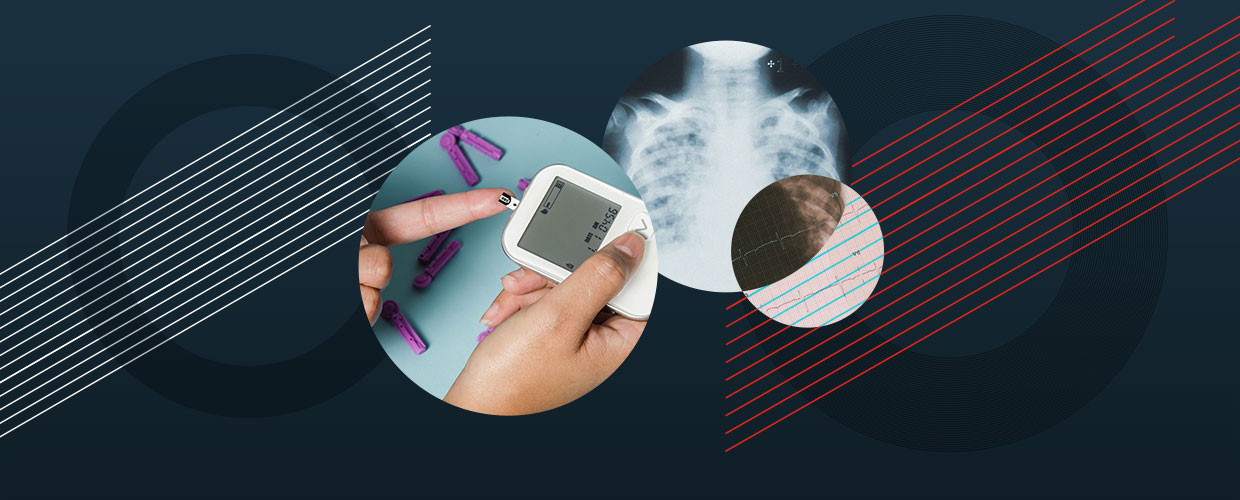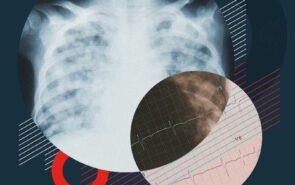By: Kathleen Sandusky
13 Jul, 2023

Today CIFAR announced details about two successful Solution Networks selected from a competitive call for proposals issued earlier this year. The two collaborative research networks, located in Québec and Ontario, will receive three years of funding to advance novel strategies for the responsible use of AI to help solve challenging problems in the Canadian health system.
“CIFAR’s call for proposals for Solution Networks in AI for health resulted in dozens of excellent proposals for ways AI can be used to advance some of the thorniest challenges in Canadian health care,” says Elissa Strome, Executive Director of the Pan-Canadian AI Strategy at CIFAR. “The breadth and quality of proposals demonstrates that not only are there rich opportunities for artificial intelligence and machine learning to help solve these problems to improve the health of Canadians and our health systems, but also that Canada has fantastic bench strength in our talented AI and health scientists.”
The two successful CIFAR Solution Networks announced today are:

With billions of diagnostic examinations conducted in health care each year, the time has never been better for the integration of AI and machine learning. Despite this, no AI platform has yet been broadly implemented across Canadian healthcare settings to assist doctors with diagnostic studies interpretations. Current AI solutions remain limited, restricted to standalone platforms like smartphone applications, or embedded within commercial offerings such as the proprietary software of transthoracic echocardiogram machines.
Based in the Montréal health system, the team will deploy a custom software called “PACS AI” that they have already designed and integrated across three Canadian hospitals. The software enables a more accurate and safer analysis of both imaging studies and electrocardiograms that are saved in the Pictures Archiving Communication System (PACS) system, which is a universal infrastructure already in use across Canada. The system is distinct from other platforms because of its interoperability, and because it allows for provider accountability, tracking, and safe ongoing system learning and user feedback. The system will also provide AI fairness metrics for the models and datasets it uses, to help clinicians better understand the limits and applicability of its training data for more reliable diagnostics across demographics.
“We envision that by the conclusion of this three-year initiative, the PACS AI program will redefine the status quo, becoming the cornerstone for integrating AI models into Canadian healthcare practice,” says Robert Avram, Co-Director of the Integrated AI for Health Imaging CIFAR Solution Network, who is affiliated with both the Montréal Heart Institute and Université de Montréal. Dr. Avram sees this leap forward as more than a possibility: “It’s a commitment to the future of healthcare.” Joining Avram as Co-Director of the Solution Network is Samuel Kadoury of Polytechnique Montréal, an expert in AI and medical imaging.
The project will also advance the wider field of AI in healthcare by sharing the software as open source, enabling developers worldwide to collaborate and continue to improve the platform and define new integrations across the different healthcare systems worldwide.
The Integrated AI for Health Imaging Solution Network will receive more than $900,000 in funding over three years, co-funded by CIFAR and IVADO, which is an interdisciplinary, cross-sectoral research, training and knowledge mobilization consortium based out of the Université de Montréal with a mission to advance the responsible use of AI. The project is the first in a recently-announced series of initiatives from CIFAR and IVADO that will develop a range of AI solutions that promise societal benefit.
Says Luc Vinet, Chief Executive Officer of IVADO, “We are pleased to announce this strategic partnership with CIFAR, which reinforces our commitment to advancing responsible AI in Canadian health systems together. By co-funding and co-sponsoring the CIFAR Solution Networks Program, we aim to foster intersectoral research and develop networks that will drive innovative solutions to urgent challenges. This exceptional collaboration to support this Quebec based team exemplifies our shared vision and reinforces our collective efforts to strengthen Canada and Quebec’s leadership in responsible AI development and deployment.”
Robert Avram (Co-Director) – Montréal Heart Institute | Université de Montréal
Samuel Kadoury (Co-Director) – Polytechnique Montréal | University of Montreal Hospital
Sarath Chandar – Polytechnique Montréal | Canada CIFAR AI Chair, Mila
Pierre-Luc Déziel – Université Laval
Julie Hussin – Université de Montréal
Pascal Thériault Lauzier – University of Ottawa Heart Institute | Stanford University

By 2030, almost 14 million Canadians will have either diabetes or pre-diabetes, which is estimated to incur almost $5 billion in direct costs to the health system. The complexity of the disease progression and diagnostics, coupled with ongoing lapses in quality, equity and trustworthiness of care based on socioeconomic factors, have led to worse rates and outcomes for some populations, with limited understanding on the part of providers and patients about risk across demographics.
The AI for Diabetes Prediction & Prevention Solution Network will receive more than $900,000 in funding over three years to develop a novel framework for the responsible deployment of already-validated machine learning (ML) models to predict diabetes risk in Ontario’s Peel region, one of the largest and most diverse communities in Canada. Working collaboratively with health system practitioners, decision-makers and community members, the team will employ a participatory approach to overcome barriers to adoption and implementation and develop a new framework that can be used to responsibly deploy AI-based technologies in health systems. The resulting framework will then be applied to the ML model, with deployment, monitoring and evaluation taking place in the final year of the project.
“Diabetes is one of the most seemingly intractable problems in public health today, with enormous costs to the health, quality of life and survival of millions of people in Canada, and wide inequities driven by socio-economic factors,” says Laura Rosella, a professor at the University of Toronto Dalla Lana School of Public Health and Canada Research Chair in Population Health Analytics who will co-direct the AI for Diabetes Prediction & Prevention CIFAR Solution Network with James Shaw, a leader in informing ethical and responsible digital health solutions. “Our hope is that by the end of the three-year project, we can share and scale the resulting AI solution and framework for better diabetes prediction and prevention as well as shape how AI applications are designed for ethical impact in health systems in Canada and internationally.”
Laura Rosella (Co-Director) – University of Toronto
James Shaw (Co-Director) – University of Toronto
Ibukun Abejirinde – University of Toronto | Women’s College Hospital
Jennifer Gibson – University of Toronto
Shion Guha – University of Toronto
Lorraine Lipscombe – University of Toronto | Women’s College Hospital
CIFAR is a registered charitable organization supported by the governments of Canada and Quebec, as well as foundations, individuals, corporations and Canadian and international partner organizations.